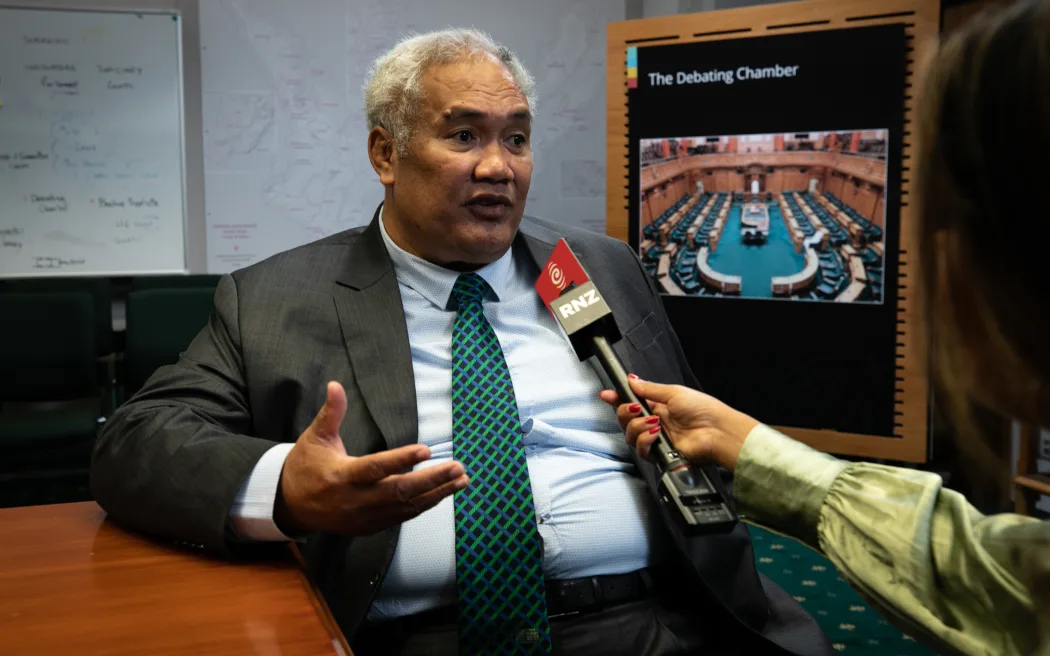The Cook Islands must take bold steps to secure its future while honouring its 60-year relationship with New Zealand, Foreign Minister Tingika Elikana told Parliament on Monday.
Addressing the 12th Meeting of the 18th Parliament, Elikana reflected on the historic 1965 decision that saw the Cook Islands choose self-rule while maintaining a constitutional link with New Zealand.
He stressed that while this relationship remains crucial, the world of 2025 demands a more proactive approach to international partnerships and economic resilience.
“Our relationship with Aotearoa New Zealand is one of shared history, family ties, and mutual respect,” Elikana said. “But just as New Zealand has sought international partnerships to advance its national interests, so too must we.”
Elikana highlighted the country’s progress over the past six decades, from its early reliance on New Zealand to becoming an independent actor on the global stage.
“In 1973, our GDP per capita was just $747 (US$425). Today, it stands at over $17,000 (US$9,693),” he noted. “We have grown from having no diplomatic partners to now engaging with 67 countries and 40 international organisations. We have become a recognised voice in regional and global affairs.”
This growth, he emphasised, has been achieved through resilience, adaptability, and a commitment to strengthening the nation’s sovereignty. The Cook Islands has increasingly taken direct responsibility for its foreign affairs and development, securing its place in multilateral agreements and forging new diplomatic relationships.
However, Elikana acknowledged that the path forward remains challenging. The country faces rising inflation, supply chain disruptions, and the growing impact of climate change. Additionally, its recent graduation to a high-income country under OECD Development Assistance Committee (DAC) criteria has reduced access to concessional financing, forcing the Cook Islands to rethink its economic strategy.
“The world today is vastly different from that of 1965,” Elikana said. “We are at a crossroads. The economic and environmental pressures we face require us to take decisive action.”
He pointed to the National Sustainable Development Agenda 2020+ (NSDA2020+), a long-term roadmap designed to guide the country toward a sustainable and prosperous future. The NSDA2020+ outlines key national priorities and serves as a blueprint for how the Cook Islands will engage with international partners.
“We must be clear about our national priorities,” Elikana said. “Our international engagements must be built on genuine partnerships—ones that respect our sovereignty and deliver real, tangible benefits for our people.”
He stressed the importance of moving beyond a single-industry economy, calling for a shift from a reliance on tourism to a more diversified approach that includes fisheries, technology, renewable energy, and financial services.
“Economic growth that supports the resilience of our people, that invests in our human and natural capital, and that prioritises quality over quantity—that is what will define us,” he stated.
While reinforcing the importance of global engagement, Elikana also reaffirmed the significance of the Cook Islands’ relationship with New Zealand. He traced the deep historical connections between the two nations, from the early voyages of their ancestors to the sacrifices of Cook Islands soldiers in World War I.
“In 1965, we chose self-governance in free association with New Zealand,” he said. “That decision was made with great foresight, and it has served us well. We are proud of this relationship—it has been mutually beneficial, and it will continue to be so.”
He dismissed recent speculation about a weakening of ties between the two nations, insisting that the Cook Islands will always value its partnership with New Zealand while asserting its right to pursue its own path.
“Our economies are intertwined, our cultures are intertwined, and our futures are intertwined,” Elikana said. “But as we celebrate 60 years of self-governance, we must also recognise our responsibility to make decisions that serve our people’s best interests.”
Elikana also urged Parliament and the Cook Islands people to embrace the nation’s evolving role on the global stage.
He stressed that the Cook Islands must remain agile, willing to take calculated risks, and ready to push boundaries to ensure long-term security and prosperity.
“Our journey to statehood has not been an easy one, but it has been worth it,” he said. “We have made bold choices, and we will continue to do so.”
He acknowledged the contributions of traditional leaders, businesses, NGOs, churches, and development partners in shaping the country’s vision for the future and called for continued collaboration in achieving the goals of the NSDA2020+.
“The power of partnership lies not in what we receive, but in what we build together,” he said.
Elikana is confidence in the Cook Islands’ ability to forge its own path.
“With enduring relationships and transformative partnerships, we know we can make it work. Much remains to be done, but our course is set, and our resolve is unwavering, ” he said.














